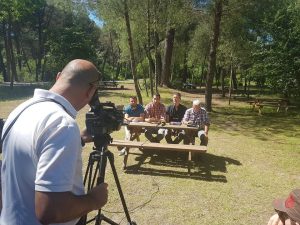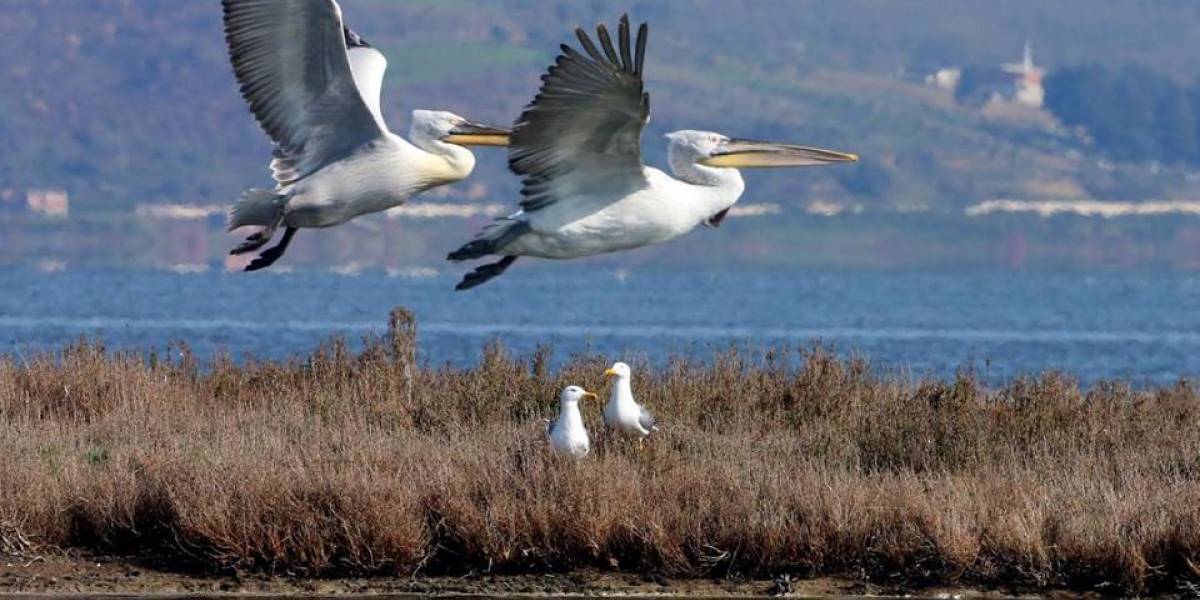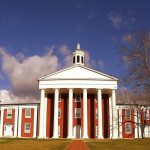
TIRANA, May 29 – Environmental NGOs have come together again to renew their calls opposing plans to develop a luxury tourist resort in a protected national park and lagoon along the Adriatic as a Kosovo company progresses with public hearings ahead of a final government decision.
Environmentalists are worried the tourism resort at the Divjaka park, some 80 km south of Tirana, seriously puts at risk the local ecosystem and its flora and fauna, including the already endangered Dalmatian Pelican population. While the government has not had its say yet, few days ago the environment ministry announced May 10 as the Dalmatian Pelican Day in a bid to raise awareness of the endangered species growing in the Karavasta lagoon, where the billion dollar development project is planned. The Karavasta Lagoon, one of the largest in the Mediterranean, is home to about 5 percent of the world’s endangered Dalmatian Pelican population.
The tourist resort project has been proposed to the Albanian government by a Switzerland-based company owned by Kosovo-Albanian billionaire and politician Behgjet Pacolli known for its construction projects in Russia and Kazakhstan during the past two decades. If given the okay by the Albanian government, the proposed 3,342 hectare project is expected to be implemented under the so-called Albania 1 Euro initiative which provides investors free of charge construction sites and facilities in return for investment and job creation.
Tirana-based Protection and Preservation of Natural Environment, the PPNEA NGO, said the proposed mass tourism development project poses a threat to the ecosystem integrity of the Divjake-Karavasta national park.
“The park protects a unique ecosystem which integrates lagoons, sand dunes, wetlands and coastal forests with a highly diverse flora and fauna. Within the park, pine forests of up to 400 years old can be found and it is one of the most important bird areas that serves as a stopover for millions of migrating birds,” PPNEA said after a press conference at the park area last weekend.
“Divjaka is the only place where the Dalmatian pelican breeds in Albania, a symbol species for the park and Albanian environment. Every other developmental project beyond the purposes of conservation of the current state would be devastating for the delicate ecosystem of the park,” the watchdog warned.
The Eco Albania and Ornithological Society NGOs have also condemned the project.
“This is not a simple construction project or a hotel with a limited number of beds but a new city that is going to be built at the heart of Divjake-Karavasta national park which is a new town twice as big as Divjaka making use of all of its assets and turning the national park into the front garden of this hotel,” said Olsi Nika of the Eco Albania environmental watchdog.
The birds study Albanian Ornithological Society says the planned multi-storey buildings would prove destructive for the park.
“We don’t agree with the development plan that has been introduced because it includes multi-storey buildings of up to 20 floors at the national Divjake-Karavasta park. This project is destructive for a considerable part of the habitats and the characteristic environment not only in Divjaka but the whole of Albania and as such these plans should be stopped,” says Taulant Bino of the Ornithological Society.
Environmental NGOS had earlier warned the project targets occupying and transforming 10 percent of the park’s territory while road, lighting and sea infrastructure would have a negative impact on all of the park’s area.
“The company is seeking to occupy about 12 km of coastline for an amount of only 1 Euro and planning to build 2,400 apartments, 370 villas, a 90-hectare tourist resort and a town for 18,000 residents, almost double compared to population of Divjaka town spanning in a much bigger area,” the NGOs had warned about the construction project at a national park whose lagoon has been under the protection of the Ramsar Convention since 1994.
Mabetex Group representatives, who in late April held a public hearing with local Divjaka residents, argue the development project represents extraordinary economic and social opportunity for residents of the region and the whole country due to job creation and stimulus to the agriculture and transportation sectors and offering security to the park’s wildlife.
“The park’s extraordinary ecosystem, with its lagoons, forest and wildlife, is the project’s stand-out feature, both in terms of its implementation and its profile. A carefully balanced construction work schedule has been planned in areas of the park that over the years have been subjected to wholesale changes,” says the company on its website about the project whose cost is estimated at about $1 billion.
The Mabetex Group executive Behgjet Pacolli, 65, is apparently the richest ethnic Albanian businessman with his fortune estimated at $1 billion. He is also involved in Kosovo politics heading the New Kosovo Alliance Party and also served as the country’s president for slightly more than a month in 2011, three years after Kosovo declared its independence from Serbia.
The Divjaka-Karavasta national park spans over a surface of 22,230 hectares offering a variety of habitats such as a river delta, lagoons, sand dunes and rich flora and fauna.
The national park is recently also emerging as a bird watching destination and has also been recommended by prestigious Lonely Planet tourist guide.
The park is also known for its sandy beaches, pine forests and trekking.
Last year, Albania extended its hunting ban with another 5 years in a bid to protect its endangered fauna. The Dalmatian pelican breeding in the Karavasta lagoon is one of the country’s most endangered species, with only a few dozens having survived in the past two decades due to illegal hunting.










